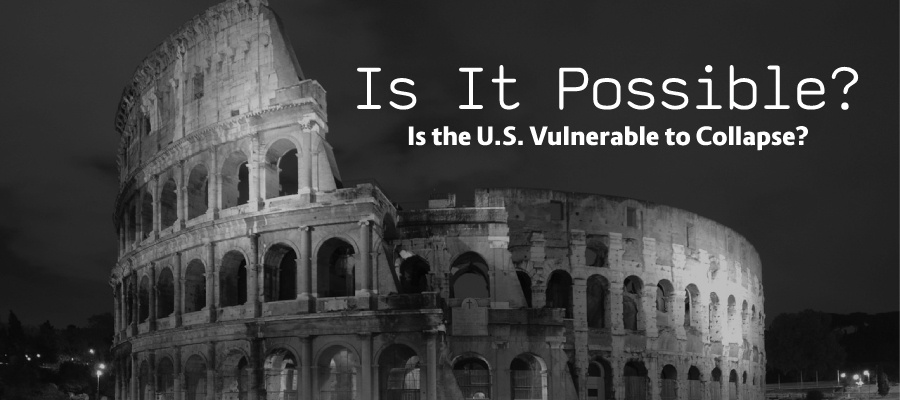Will The United States Collapse?
The United States is currently faced with economic hardships and the potential for global war. Match this with compelling historical cycles of global power shifts, historical cycles of economic upheaval and war, and things begin to look a little grim for America. At the same time, our nation seems divided more than ever, and few seem willing to bridge the divide. As a result, rumors of collapse have again begun to surface on social media, and scholars are again examining the possibility. Are we genuinely faced with such a threat?
Why Civilizations Collapse
Nations rise, and nations fall. This has been true since the beginning. However, a solid example to examine might be that of the Roman Empire. Many factors contributed to its collapse. Some of the most significant include:
Military spending: The Roman Empire maintained a large military to defend its territory and expand its borders. This required a significant amount of resources, which strained the economy.
Political instability: The Roman Empire was beset by political instability, with a series of weak and ineffective leaders who could not effectively govern the empire. This contributed to a decline in morale and a loss of confidence in the government.
Invasions by barbarian tribes: The Roman Empire was constantly threatened by barbarian tribes on its borders. These invasions significantly drained the empire’s resources and contributed to its decline. Another way to say this might be “perpetual war.”
Economic decline: The Roman economy depended heavily on slave labor, which became less available as the empire declined. This led to a reduction in productivity and a strain on the economy.
Over-reliance on slave labor: The Roman Empire relied heavily on slave labor, which led to a decline in the number of citizens who were able or willing to work. This further strained the economy and contributed to the empire’s decline.
Government corruption: The Roman government was plagued by corruption, which made it difficult for the empire to effectively govern its territories and maintain order.
When I examine this list, I am rightfully alarmed. In the United States, our military spending is unbelievably high, we have and have had weak and ineffective leadership for decades, we have perpetual wars, economic decline, an alarming unwillingness to work, overreliance on government programs from many, and extensive and alarming government corruption at almost all levels. In many ways, we check all of the boxes. But can the events of the ancient past translate into modern terms?
A Modern Translation
To better understand the threat, one must pull back and examine things in a broader context. The list of factors changes slightly when considering a collapse in modern terms. Some of the most common factors in modern times include:
Environmental factors: A civilization’s environment can significantly affect its collapse. For example, if the civilization depends on a resource that becomes scarce or is damaged by environmental degradation, it could lead to its decline.
Economic factors: Economic collapse can be a major contributor to the decline of a civilization. Factors include over-reliance on a single resource, economic mismanagement, or external economic pressures.
Political factors: Corruption, compromised political figures, and political instability, such as civil war or revolution, can lead to the collapse of a civilization.
Social factors: A civilization’s social structure and values can also play a role in its collapse. If a society becomes overly hierarchical or unequal, it may be more vulnerable to collapse.
External factors: A civilization may also be vulnerable to collapse due to external factors, such as invasions by other civilizations or natural disasters.
Much like with the Roman Empire, we must remind ourselves that the collapse of a civilization is often the result of a combination of these and other factors rather than a single cause. However, when we examine both lists, the threat appears very real and on several levels. Knowing and understanding the lessons provided by history are important. In many ways, the United States checks every box on both lists. Ultimately, and at the very least, we must admit that the potential is there. Individually, we should plan accordingly.
Granted, cycles are not guarantees. However, they do provide compelling insight and warnings due to the nature of repetitive coincidences. Unfortunately, civilizations are much more fragile than most would ever want to presume. The United States is not immune. Will the United States collapse? It is possible. Over a long enough period of time, and if the current trends continue, it’s highly probable.
It doesn’t have to be this way. Instead of accepting that notion as inevitable, perhaps we should heed these warnings and find a way to come together to find real solutions to our seemingly systemic problems instead of further dividing ourselves and pointing the finger. While everything must come to an end, it doesn’t have to happen right now. We just need to get to work if we want to prevent it from happening sooner rather than later.
Where do we start? We should always start with the “vision.” You cannot love, support, exercise, or defend something you do not truly know. We are currently lost because we lost sight of that vision. The longer we ignore that vision, the further down this road we will go and the harder it will be to find our way and come back. Accurately understanding what we are supposed to be, and destroying false narratives and misconceptions that mislead you, are excellent first steps. Of course, that requires a strong desire to be accurate instead of “right.”
Whether you want to say that history repeats or rhymes, the fact is that we seem to want to revisit it in various ways. Sometimes with mathematical precision. Various models demonstrate this truth. Some models are more accurate than others. I would encourage that you explore this interesting phenomenon to gain great insight into potential expectations.




